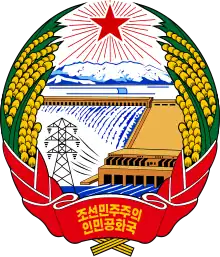North Korea–Yugoslavia relations
North Korea–Yugoslavia relations were historical foreign relations between North Korea and now broken up Yugoslavia. The Socialist Federal Republic of Yugoslavia and the Democratic People's Republic of Korea established diplomatic relations on 30 October 1948. During the initial period of the Korean conflict, motivated by the recent Tito-Stalin split and contrary to other countries in Eastern Europe, Yugoslavia remained firmly not aligned to any of the blocs in the Korean War.[1] Yugoslavian literature compared attack on South Korea by North Korea as similar to the attack on Yugoslavia by the German Army and the attack on Hawaii by the Japanese army while Yugoslav representation at the United Nations even accused the Soviet Union of having started the Korean War.[2][1]
 | |
North Korea |
Yugoslavia |
|---|---|
Relations were very close during the time of Josip Broz Tito and Kim Il Sung. Both leaders had taken a neutral stance during the Sino-Soviet split and maintained friendly relations with both the Soviet Union and China.[3] Yugoslavia and North Korea were members of the Non-Aligned Movement with Yugoslavia being one of the movement's founding members.[3]
Bilateral agreements
- 25 May 1971: agreement on trade and payments.
- 4 September 1973: agreement on the abolition of visas between the two countries.
- 4 November 1974: agreement on cultural cooperation.
- 22 February 1975: agreement on the setting up of a consultative commission for economic and scientific-technical cooperation.
- 6 November 1975: agreement on air services.
- 11 December 1975: agreement on cooperation in telecommunications.
- 20 February 1978: agreement on cooperation in the fields of health, medical science and pharmaceuticals.
- 20 September 1978: agreement on providing health services free of charge to the diplomatic personnel and members of their families on a reciprocal basis.
- 4 March 1982: agreement on the mutual abolition of visas between the SFRY and the DPR of Korea for citizens of the two countries holding ordinary passports when travelling on business.
References
- Chul-Min, Kim (2009). "The View and Understanding of Yugoslavia on the Korean War: An Analysis through Illustrations". International Area Studies Review. 12 (3): 43–56.
- Elina Kulla, Rinna (2013). "Europe's Détente and Yugoslavia's Decline. The Birth of the CSCE across East Europe and the Waning of Tito's Influence athwart the Mediterranean South". Les cahiers Irice. 2012/1 (10): 97–106.
- Ramani, Samuel (16 October 2017). "What North Korea Learned From the Kosovo War". The Diplomat.


.svg.png.webp)